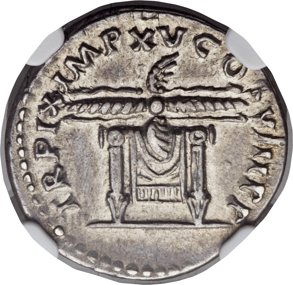Additional References: BMCRE 51-4. RSC 316.
Notes: Laureate head of Titus right / winged thunderbolt on draped throne.
Obverse: Titus (Latin: Titus Flāvius Caesar Vespasiānus Augustus;[a] 30 December 39 AD - 13 September 81 AD) was Roman emperor from 79 to 81. A member of the Flavian dynasty, Titus succeeded his father Vespasian upon his death, thus becoming the first Roman Emperor to come to the throne after his own biological father.
Prior to becoming Emperor, Titus gained renown as a military commander, serving under his father in Judea during the First Jewish?Roman War. The campaign came to a brief halt with the death of emperor Nero in 68, launching Vespasian's bid for the imperial power during the Year of the Four Emperors. When Vespasian was declared Emperor on 1 July 69, Titus was left in charge of ending the Jewish rebellion. In 70, he besieged and captured Jerusalem, and destroyed the city and the Second Temple. For this achievement Titus was awarded a triumph: the Arch of Titus commemorates his victory to this day.
Under the rule of his father, Titus gained notoriety in Rome serving as prefect of the Praetorian Guard, and for carrying on a controversial relationship with the Jewish queen Berenice. Despite concerns over his character, Titus ruled to great acclaim following the death of Vespasian in 79, and was considered a good emperor by Suetonius and other contemporary historians.
As emperor, he is best known for completing the Colosseum and for his generosity in relieving the suffering caused by two disasters, the eruption of Mount Vesuvius in AD 79 and a fire in Rome in 80. After barely two years in office, Titus died of a fever on 13 September 81. He was deified by the Roman Senate and succeeded by his younger brother Domitian.
From Wikipedia
Prior to becoming Emperor, Titus gained renown as a military commander, serving under his father in Judea during the First Jewish?Roman War. The campaign came to a brief halt with the death of emperor Nero in 68, launching Vespasian's bid for the imperial power during the Year of the Four Emperors. When Vespasian was declared Emperor on 1 July 69, Titus was left in charge of ending the Jewish rebellion. In 70, he besieged and captured Jerusalem, and destroyed the city and the Second Temple. For this achievement Titus was awarded a triumph: the Arch of Titus commemorates his victory to this day.
Under the rule of his father, Titus gained notoriety in Rome serving as prefect of the Praetorian Guard, and for carrying on a controversial relationship with the Jewish queen Berenice. Despite concerns over his character, Titus ruled to great acclaim following the death of Vespasian in 79, and was considered a good emperor by Suetonius and other contemporary historians.
As emperor, he is best known for completing the Colosseum and for his generosity in relieving the suffering caused by two disasters, the eruption of Mount Vesuvius in AD 79 and a fire in Rome in 80. After barely two years in office, Titus died of a fever on 13 September 81. He was deified by the Roman Senate and succeeded by his younger brother Domitian.
From Wikipedia
Denomination: In the Roman currency system, the denarius was a small silver coin first minted about 211 BC during the Second Punic War. It became the most common coin produced for circulation but was slowly debased in weight and silver content until its replacement by the double denarius, called the antoninianus, early in the 3rd century AD. The word denarius is derived from the Latin dēnī "containing ten", as its value was 10 asses, although in the middle of the 2nd century BC it was recalibrated so that it was now worth sixteen asses or four sestertii. It is the origin of several modern words such as the currency name dinar; it is also the origin for the common noun for money in Italian denaro, in Portuguese dinheiro and in Spanish dinero.
From Wikipedia
From Wikipedia
Period: Imperial Rome. As the Roman Republic began to implode because of
corruption and infighting among powerful members of the Roman Senate, a new type of
Roman Republican coinage emerges, that of the military strongmen who dominated and
fought among each other before the final fall of the Republic. The drama surrounding
the fall of the Roman Republic is a story full of political intrigue, military action, betrayal,
murder and sex scandals. Different parts of this story have been told and retold by
ancient historians, modern day scholars, dozens of Hollywood movies and even an HBO
miniseries. All of the actors in this great drama, Crassus, Pompey, Julius Caesar, Brutus
and Cassius, Mark Antony and Cleopatra and the last man standing at the end of it all,
Octavian (later known as the first emperor of Rome, Emperor Augustus) all minted coins
during this time bearing their names and propaganda images supporting their factions
and political ideals.
Culture: Ancient Rome. A famous catch phrase "Rome was not built in a day"
definitely applies to the Roman civilization. Rome stated as a series of small villages among the
famous seven hills of Rome along the river Tiber. Eventually through conquest, diplomacy, wise
policies of indirect rule and assimilation, the Romans were able to not only unify the Italian
peninsula, but though a series of brutal wars against regional powers established a great Empire
that spanned Europe, Asia and Africa, making the Mediterrean Sea and "Roman Lake."
All Roman coinage can generally be divided into eight time periods as described below. An interesting thing about Roman coins minted during these eight time periods is that you can literally see the "Rise and Fall" of the Roman Empire on its coinage as the sharp imagery and pure silver and gold coins of the Roman Republic and Early Imperial Period gradually devolves into crude, illegible and heavily debased coins of the "Barracks Emperors" and "Barbarian" Period.
All Roman coinage can generally be divided into eight time periods as described below. An interesting thing about Roman coins minted during these eight time periods is that you can literally see the "Rise and Fall" of the Roman Empire on its coinage as the sharp imagery and pure silver and gold coins of the Roman Republic and Early Imperial Period gradually devolves into crude, illegible and heavily debased coins of the "Barracks Emperors" and "Barbarian" Period.
Item created by: gdm on 2016-08-14 12:16:08
If you see errors or missing data in this entry, please feel free to log in and edit it. Anyone with a Gmail account can log in instantly.
If you see errors or missing data in this entry, please feel free to log in and edit it. Anyone with a Gmail account can log in instantly.








